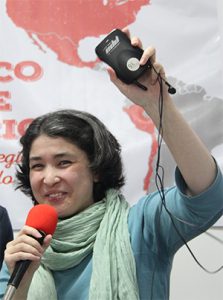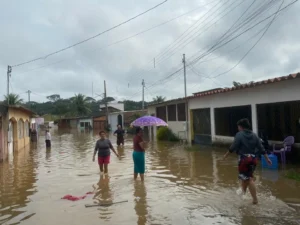The Global South has much to lose with so called Free Trade Agreements – Interview with Sanya Reid Smith*
By Gerhard Dilger
Ms. Smith, what chances and what risks are there for the countries of the Global South when negotiating so-called new generation free trade agreements (FTAs), or vampire treaties? Let´s take the Mercosur-EU negotiations as an example.
 Latin America is facing many FTA negotiations at the moment and they’re all being negotiated in secret, so they can be called vampire treaties – we don’t know what’s in them unless the text is leaked. Mercosur is currently negotiating a FTA with the European Union and what they are going to be asked to do, we think, is to remove the tariffs on 87 to 90 per cent of EU products coming into their countries.
Latin America is facing many FTA negotiations at the moment and they’re all being negotiated in secret, so they can be called vampire treaties – we don’t know what’s in them unless the text is leaked. Mercosur is currently negotiating a FTA with the European Union and what they are going to be asked to do, we think, is to remove the tariffs on 87 to 90 per cent of EU products coming into their countries.
What happens when you remove tariffs on the EU products coming into your country? One thing is the government loses money. They lose that tax that you would get on imports, and so, for countries like Paraguay, 12 per cent of their government revenue is from tariffs on imports. If they remove that, how can they get the money back from other taxes? Tariffs are the easiest tax to collect… Compared to value added tax, or income tax or corporate tax, IMF economists looked at what happens when you remove tax: Can you make the money back from other taxes? And they’ve found that, for middle-income countries like Paraguay, at best you make back 45 to 60 per cent of the lost revenue so that’s a permanent loss of revenue for the government of at least 40 per cent for tariffs cut because of the EU FTA.
And, of course, Europe could export more products to Mercosur. The EU has said that they think they can export more dairy products, more pork and more wine; now, remember that the European Union heavily subsidizes their farmers – dairy farmers and pork farmers – and those subsidies will continue. They will never abolish those subsidies in the free trade agreement. So, Mercosur will be asked to remove their tariffs to allow in the subsidized European dairy products and pork that could be cheaper than their own farmers’ and then cause difficulties for those farmers. So they could lose the protective tariffs against the subsidized EU food products coming in.
Would the Mercosur countries be able to export more as well?
It depends. The European Union says that they want Mercosur to remove their export taxes on raw materials. Some Mercosur countries have export taxes on raw materials like leather and wool to make sure that there are enough cheap inputs for their processing industries: for their shoe industry, or their luggage industry, for example. But the EU says they don’t have any raw materials left. They want the developing countries to export their raw materials to Europe; Europe will turn them into furniture and handbags and sell them back to Mercosur!
So the EU wants the cheap raw materials from Mercosur by forcing Mercosur to abolish its export taxes, so that the jobs with value added can be in Europe. That would mean, then, that if Mercosur agrees to it, that will make life more difficult for their value added processing industries and the workers who are in those sectors and, of course, they will also lose government revenue from not having export taxes.
Would there be impacts in other areas?
The FTA with Europe is also like likely to cover services. You can think of a service as everything you cannot drop on your foot, from essential services like water, electricity, postal services, telecoms, to things like banks, supermarkets and petrol stations. And so this would mean that Mercosur opens up to more European companies to come in and compete whether it’s banks or water companies or telephone companies and so on. And the Europeans may try to restrict Mercosur’s ability to regulate services; for example, by restricting Mercosur’s ability to make sure that essential services like water are affordable.
And Europe is going to ask Mercosur to agree to liberalize government procurement. This is opening the purchasing by government ministries of products and services, and this can be 25 per cent of your gross domestic product, it’s a big proportion of your economy. And today the Mercosur governments say that, when the ministry buys paper for the photocopiers, cars for their ministers, electricity for the public hospitals, builds a public school or a highway, they give preferences to local companies to supply the government with these products and services. So they say, ok, only local companies can do this or even if the local company is a few per cent more expensive, it’s the Mercosur companies who can supply the government.
The EU wants that to be open. If the EU company is cheaper, it gets to supply the Mercosur government. So, that means job losses for the Mercosur countries, who no longer have those contracts and it can also affect their trade balance because they’re importing more of it instead of using locally produced goods or services.
Finally, Europe wants to negotiate is called intellectual property, i. e. monopolies on medicines and textbooks. The new rules are likely to make medicines, textbooks, seeds, other agricultural imports more expensive for longer in the Mercosur countries – that means more unaffordable medicines for longer periods.
The United Nations special rapporteurs on human rights like the right to health and the right to food have said that developing countries should not agree to this, because these kinds of intellectual property rules harm human rights. Nevertheless, we expect Europe to ask Mercosur to agree to this. So this is what is currently being negotiated, we think, in the Mercosur-EU FTA negotiations.
On the other hand, we know that Brazil, for example, has been negotiating for years and even under a left-wing government, because of their very strong agribusiness.
The EU will never lower their agriculture subsidies. They refuse to lower them even by one dollar in the World Trade Organization (WTO) and they don’t lower them in their FTAs because they say ‘it all has to be done in the WTO, we can’t do it under just a bilateral agreement’.
Some of the other negotiations that are going on in Latin America. Mexico and Chile have said that they want to modernize their EU FTAs. What does this mean?
Mexico has had a first round, and Europe has released a road map of what they want covered in these negotiations. And Europe has said they want the EU-Mexico updated FTA – there’s an existing one which is an old one –, they want the updated one to be comparable to the Comprehensive Economic and Trade Agreement CETA, the Canada-EU FTA, which would have a lot of additional obligations on Mexico that are not in the current Mexico-EU FTA.
In services, the EU, we think, based on the Canada-EU FTA, would want to restrict Mexico’s ability to regulate services companies. So, for example, Mexico could not change their laws or regulations or have any new ones on service companies. This could be anything from nuclear power stations, to hospitals, to banks, and we know, for example, that, in the banking sector, after a financial crisis, you learn the lessons and you need to re-regulate, right?
In CETA there are also other restrictions on the ability to regulate services, for example that your regulations have to be as simple as possible. That is the main criteria, which can mean that you cannot have public consultations or environmental impact assessments or health impact assessments,for example, before you allowed mines or supermarkets. Furthermore, based on the CETA, the Mexican government’s ability to use licensing fees on service companies to raise revenue for national, provincial or local governments or to cross-subsidize a public hospital from a private hospital or to discourage something they don’t want like casinos for example by charging them a million dollars a year in licensing fees would be restricted.
In intellectual property, based on CETA, Mexico would have to agree to an eight-year monopoly on medicines, even when there’s no patent. Now, this is worse than the Trans-Pacific Partnership Agreement (TPP), that Mexico just signed, which is only a 5-year monopoly. So the EU would ask for three extra years with the medicine at the high monopoly price before you could get the generic version at a cheaper price.
In the investment chapter, the EU, based on CETA, would ask for strong investor protection for EU investors in Mexico. This would mean, for example, if the Mexican government does something that reduces the profits of the European companies, then the European companies could sue the Mexican government via investor-to-state dispute settlement (ISDS) at an international tribunal, for unlimited monetary damages and compound interest, compounded every month at commercial interests rates, from the dates the government took the action. And this would enable investors from new EU countries to sue Mexico, who currently cannot sue the Mexican government at an international tribunal. This issue has been so controversial in Transatlantic Trade and Investment Partnership (TTIP) that some European governments don’t want it with the US, but they’re happy to impose it on Mexico.
For Chile, when they are modernizing their EUFTA, it is not yet clear what types of additional rules will be negotiated. But if it’s goingto be like Mexico’s, it would have the same problems that we just went through.
What would the Trade and Services Agreement (TiSA) mean to Latin American countries?
TiSA is an FTA just about services. It includes mostly industrialized countries like the European Union, United States, Australia, New Zealand but in Latin America it includes Mexico, Chile, Colombia, Costa Rica, Panama and Peru. All of these countries already have US FTAs, but TiSA could go beyond their existing FTAs in a number of ways.
This could include, for example, again, restrictions on the ability to regulate services, even if they’re non-discriminatory regulations for health and safety and so on, or restrictions on labour rules, like the minimum wage. Then there is also a proposal to have an extreme opening to foreign energy companies. So this is a leaked proposal made by Norway and Iceland where basically they want their energy companies to be able to invest in all the energy sectors. There are also proposed provisions that would make it harder to regulate companies in the event of a financial crisis because it would be harder for governments to get the data they need to be able to regulate them effectively. In addition there is a proposal for extreme opening of government procurement, more than what their current FTAs have. And Brazil is thinking about joining the TiSA as well, apparently.
That’s what some ministers said in June.
Right. So, if Brazil joins, it would be a much more extreme change for Brazil, because it doesn’t already have a US free trade agreement. So, if Brazil joins TiSA, for the first time, it would be opening to foreign service companies to come into Brazil on what we call a negative list basis. So, service companies from other TiSA countries would get the same treatment as Brazilians in all sectors, except for in sectors which all the other TiSA governments agree that you can exclude.
And, for Brazil, based on the leaked proposals, in addition to opening its government procurement in services, they would also be for the first time opening the procurement of any state-owned companies. So, if, for example, Brazil has a state-owned postal service, and they buy electricity for their post offices, today, they could say we only buy electricity from Brazilian companies. But, under TiSA, that would be opened up to electricity companies from other TiSA countries.
And when Petrobras buys things, they would have to open up their procurement of services to suppliers from the other TiSA countries. TiSA would also, for the first time, deregulate the financial sector in Brazil to make a financial crisis more likely and TiSA for the first time would require Brazil to allow sensitive information of Brazilian citizens, like health records, tax records and financial records to be sent to any country in the world with insufficient privacy exceptions. This locks in the ability of the US government to spy on Brazilian data the way that Edward Snowden disclosed the NSA is doing. Brazilians’ data could also be sold to advertisers and insurance companies and so on. So this would all be new for Brazil.
And it’s not clear to me why countries of the South countries are in TiSA, because it’s the countries of the North who are good at exporting services. Even the United Nations says that “developed” countries are the ones with the advantage in exporting services, except for exporting human beings who want to work. And the North will never open to Southern workers in TiSA, they don’t open it in FTAs generally, because they want to restrict immigration. So that’s the only services area where “developing” countries have an advantage, exporting human beings who can work in the US, but they will not get that in TiSA. So I don’t know why the countries of the South are in TiSA. Economically, it doesn’t seem that the benefits would outweigh the costs.
Anyway, Uruguay had a great victory last year, precisely because of the massive mobilization within the trade unions within the governing left-wing coalition which convinced the government of Tabaré Vázquez to withdraw from the TiSA negotiations. Are there other positive tendencies worldwide?
Paraguay also withdrew from the TiSA negotiations and Singapore, too; even for Singapore the benefits didn’t outweigh the costs and they have very strong airlines and banks etc. What hope do the other countries from the South have for the benefits to outweigh the costs for them of joining TiSA? The FTA of the Americas (FTAA/ALCA) was never concluded. And part of that, people say, is because the text was released. So a former US trade minister was asked why they didn´t release the text of the TPP and he said: “We tried that in the FTAA and it didn’t work because people suddenly realized what was in it and they opposed it…” So it goes to show they are correctly named vampire agreements. Once people know what’s in it, they oppose it, because it’s un-democratic legislating through the back door, in secrecy.
So that was the big one that didn’t conclude and before that there was the Multilateral Agreement on Investment which didn’t conclude and a number of countries which started negotiating a US FTA have decided not to go ahead…
…for example…
…the Southern African Customs Union, because they were worried about the way it would cause medines to remain unaffordable for longer and what it would mean for affirmative action in government procurement for black South Africans. Switzerland started negotiating a US FTA, but after two rounds, they said to the US: “Look, do you really have to have this on agriculture and intellectual property”, and the US said “we have to”, so Switzerland said: “ok, but no thanks, let’s stay friends, but no FTA”. So, a number of countries see that it’s actually going to be a bad deal and for their own national interest they walk away and they don’t conclude.
And of course, there’s a discussion in Europe about TTIP where there have been mixed responses even from centrist sectors of society. Is there anything you’d like others to learn from this experience, this discussion and Europe or even in the United States, where even state governments are opposed to some of these rules…
Yes, I think it’s a good lesson for the governments in Southern countries that if some Northern countries’ governments think that these agreements are a bad idea because they restrict their ability to regulate and expose them to expensive ISDS cases, then how can Southern governments afford them? In the US, at the state level, all the 50 state parliaments regularly pass resolutions against ISDS because they want to be able to regulate and, on the services side, they have opposed what we call the necessity test in TiSA and the TPP because it restricts their ability to regulate.
Are the governments of the Global South going to be able to afford these FTAs? You would think they would be more worried, because, they have less money to pay for these US$ billions in damages per ISDS case and in some ways, they have more need to regulate because they don’t yet have all the regulations they need. For example, they might not yet have noise pollution laws and so they have to have new regulations, and then as they develop economically and socially, and the capacity of their government to regulate develops, they need to update their regulations. But the standstill provisions in these FTAs can prevent developing countries from being able to have these new regulations or update their existing ones.
Could you explain the certification process the US government is imposing on the TPP countries and its implications?
Three Latin American countries, Chile, Peru and Mexico, have signed the TPP which includes the US, so it is the standard US FTA with new problematic provisions and eight other countries. And the US has passed a fast-track law to approve these FTAs on a yes-no basis without changing them and one of the conditions for this is that the US government must certify that the other countries have complied. Now, this applies to the TPP, to TiSA and also to TTIP so the European governments will face it. And what this process involves is the US’s use of this certification process to ask for extra things, extra obligations, extra benefits for the US beyond the signed text of the FTA and we can see this happened to countries in Central America, they were asked for another three-year monopoly on medicines in the certification of their USFTA, even though it wasn’t in the text.
Certification can also mean the US government will write your implementing law for the FTA. They wrote the entire Peru environment law and gave it to the Peru parliament and said: “Pass it with no changes,” and the US government sat in the Peru Parliament to make sure it went through with no changes. So this process is going on now for the TPP countries, including Chile, Peru and Mexico, which will involve negotiating their domestic implementing laws with the US government in round after round of negotiations or the US government could just write the whole thing for you and tell the parliament: “Pass this with no changes”. Even Australia, a ‘developed’ country, went through this in its US FTA. Australia didn’t want to agree to longer copyright, because they wanted affordable textbooks etc., so when the Australian parliament was passing implementing laws for its USFTA they put in a broad exception to copyright, but after it passed the Australian parliament, the US government looked at it and said: “That is unacceptable, go back and do it again”. And the Australian parliament had to sit again to pass a narrower copyright exception that’s unusable and has not been changed.
So this torturing of governments happens even to developed country governments and it’s a process that’s going on now and we expect, for example, that, because of pressure from some US senators, that, in this process, the US will ask Chile, Peru, Mexico and the other TPP countries to agree to a longer monopoly on medicines, like another three years, even when there’s no patent. And, biologic medicines for example to treat cancer can be very expensive at these monopoly prices, for example US$500,000 per patient per year. So the US might ask for another three or even an additional seven years at that price in this certification process, even though it’s not required by the signed text of the TPP.
Are the Europeans trying to “learn” from this?
I don’t know if Europe certifies countries of the South. The question is: How is Europe going to cope with being certified by the US in TTIP because it’s a legal requirement of the US and in the TPP and the past few US FTAs they were allowed to do it by the text and we know that they’ve already started that process in the TPP, and they’ve done it for every USFTA since Chile’s.
*Sanya Reid Smith is a legal advisor and senior researcher of the Third World Network




